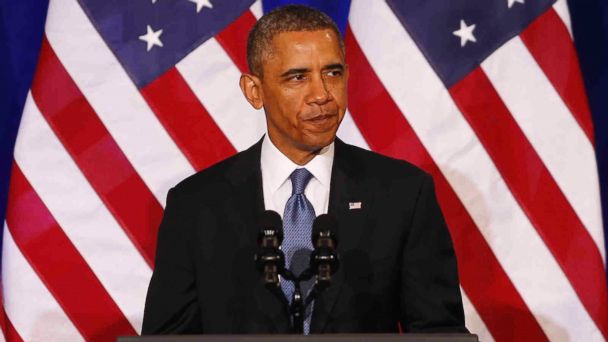Obama Calls for End of NSA Phone Records Storage
President Obama today ordered a move toward overhauling the so-called metadata program that collects and stores millions of Americans' phone records, specifically saying the National Security Agency should not continue to hold the information but defending the nation's overall spying efforts.
"I believe it is important that the capability that this program is designed to meet is preserved. Having said that, I believe critics are right to point out that without proper safeguards, this type of program could be used to yield more information about our private lives, and open the door to more intrusive, bulk-collection programs," the president said at the Department of Justice today.
"I am therefore ordering a transition that will end the Section 215 bulk metadata program as it currently exists, and establish a mechanism that preserves the capabilities we need without the government holding this bulk meta-data."
RELATED: NSA Review Panel Defends Its Recommendations
The president did not specify what entity would hold metadata in the future, but he tasked U.S. Attorney General Eric Holder and the intelligence community to develop a plan by March 28, when the program is up for reauthorization, to move metadata out of the control of the NSA.
The president also said that effective immediately, the intelligence community would only "pursue phone calls that are two steps removed from a number associated with a terrorist organization instead of three."
Also starting today, a judicial finding will be required in order for the database to be queried. "We will reform programs and procedures in place to provide greater transparency to our surveillance activities, and fortify the safeguards that protect the privacy of U.S. persons," the president said.
RELATED: What's Next for the Embattled NSA Surveillance Program
Obama assured Americans that the intelligence community has not "sought to violate the law or is cavalier about the civil liberties of their fellow citizens."
"The men and women of the intelligence community, including the NSA, consistently follow protocols designed to protect the privacy of ordinary people," he said. "They are not abusing authorities in order to listen to your private phone calls, or read your emails."

(Photo Credit: Charles Dharapak/AP Photo)
The president also offered assurances to the international community, promising that the United States will not monitor communications of allied heads of state and that the United States will extend certain privacy protections to non-U.S. citizens.
"The bottom line is that people around the world - regardless of their nationality - should know that the United States is not spying on ordinary people who don't threaten our national security, and that we take their privacy concerns into account. This applies to foreign leaders as well," he said. "Unless there is a compelling national security purpose - we will not monitor the communications of heads of state and government of our close friends and allies."
It's unclear which components of his overhaul, if any, require congressional approval.
The president is assigning a senior official at the White House the task of implementing new privacy safeguards. The State Department will also appoint a senior officer to handle the diplomatic front of technology and signals intelligence.
President Obama made brief reference to Edward Snowden, the NSA leaker who first shed light on the agency's surveillance tactics in the summer.
"Given the fact of an open investigation, I'm not going to dwell on Mr. Snowden's actions or motivations. I will say that our nation's defense depends in part on the fidelity of those entrusted with our nation's secrets," he said. "Moreover, the sensational way in which these disclosures have come out has often shed more heat than light, while revealing methods to our adversaries that could impact our operations in ways that we may not fully understand for years to come. "
This is a middle-ground course of action that's unlikely to please neither civil liberties advocates nor those who say the program is essential for national security.
Sen. Rand Paul, R-Ky., one of the most vocal critics of the NSA program, said he was "encouraged" by the president's speech but that he's "disappointed in the details."
"President Obama's announced solution to the NSA spying controversy is the same unconstitutional program with a new configuration," Paul said. "The American people should not expect the fox to guard the hen house."
The American Civil Liberties Union called it "highly troubling" that the president didn't complete end the collection of American's phone records.
"The president's decision not to end bulk collection and retention of all Americans' data remains highly troubling," Anthony Romero, executive director of the ACLU, said. "The president should end - not mend - the government's collection and retention of all law-abiding Americans' data. When the government collects and stores every American's phone call data, it is engaging in a textbook example of an 'unreasonable search' that violates the Constitution."